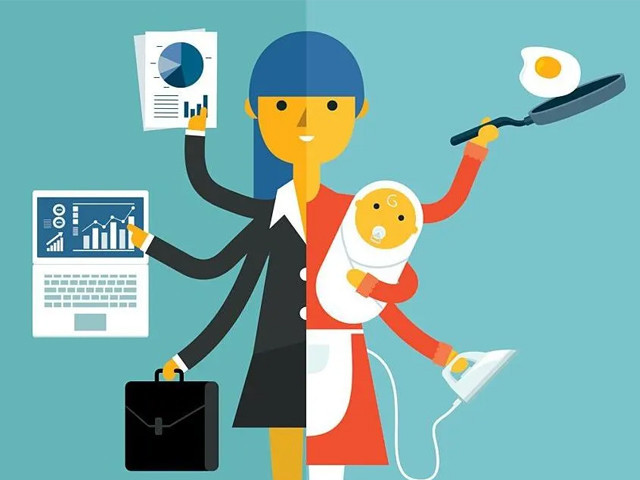Mothers are our greatest treasures. However, motherhood many a times comes at the expense of a woman’s dreams, needs and physical/mental health.
We must institute measures to support working mothers so that they can thrive, and accomplish multiple goals simultaneously, if they wish to do so. When we think of the word ‘mother’, we think of a superhuman who raises kids, manages a home, and has a plethora of responsibilities on her shoulders associated with womanhood. Mothers across the globe have shouldered this pressure since time immemorial; whether they are working moms or stay-at-home moms.
For working mothers, the pressures and expectations are amplified many fold. Extensive research highlights the anxiety and stress working mothers face while balancing their work and family life as they try to ensure the emotional, physical, social and economic health of their families. Some of the most common issues faced by working mothers is sleep deprivation and exhaustion; they are unable to find time to focus on their own health, fitness and emotional needs.
Often, taking time off from work is difficult, while breastfeeding small children is another challenge. The mom guilt that comes with this lifestyle is also very real! Not being able to give their family enough time or attention results in delays in gratification for working mothers, which causes intense internal turmoil. For many women, the brutal balancing act results in them quitting their hard-earned careers or opting for part-time lower pay work.
This phenomenon not only impacts women but has an impact on the socio-economic conditions of our country. Qualified, competent women are unable to work due to domestic conditions or inflexible, unfriendly organisational policies, resulting in a dearth of talent in the workforce. If these women received support with interventions that allowed them to create a balance between their motherhood and professional duties, they would thrive socially, emotionally and economically, ultimately bridging workforce gaps and increasing productivity.
Working mothers can be supported in several ways:
- By ensuring that all organisations give women short-term maternity leave and an extended flexible model of maternity leaves whereby after three months, a mother can take part-time work for the next three months and gradually increase the duration as the infant matures. This is essential for the first year for both the mother and the child.
- Instituting paternal leaves at least for the first six weeks till the follow-up postpartum check-up.
- Provide flexible work opportunities and have friendly policies; for instance, half-day casual leaves for a school meeting or event, compassionate leaves if any of the mothers have children with special needs etc.
- Integrate parenting education sessions with routine retreats in the institutions so that mothers and fathers have a platform to address their parental queries.
- The government should make it mandatory for every organisation with more than three working mothers to have a day care service on their premises for young children.
- Spouses and families should prioritise the career aspirations of working mothers and avoid enforcing gender-focused roles. Fair and shared division of responsibilities at home is key.
- Supporting working mothers with their continuing education and giving them time off for self-care.
- Do not stigmatise working women as mothers with lesser interest in their kids and more in their careers.
Motherhood, though extremely rewarding, is one of the toughest jobs in the world. It is a beautiful journey of life that women should be able to enjoy and treasure without unrealistic expectations and heavy burdens. It is up to all of us in society to support mothers and ensure that working mothers do not have to compromise on any aspect of their journey.
“Every mother works hard, and every woman deserves to be respected.” Michelle
Obama



COMMENTS (5)
Comments are moderated and generally will be posted if they are on-topic and not abusive.
For more information, please see our Comments FAQ